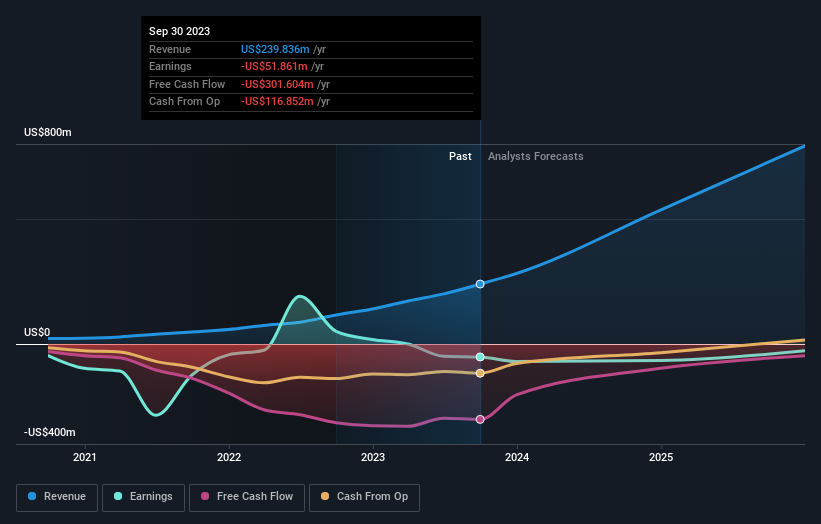Private companies own 34% of The Lion Electric Company (TSE:LEV) shares but individual investors control 44% of the company
Key Insights
Significant control over Lion Electric by individual investors implies that the general public has more power to influence management and governance-related decisions
A total of 5 investors have a majority stake in the company with 50% ownership
Insiders own 12% of Lion Electric
A look at the shareholders of The Lion Electric Company (TSE:LEV) can tell us which group is most powerful. And the group that holds the biggest piece of the pie are individual investors with 44% ownership. That is, the group stands to benefit the most if the stock rises (or lose the most if there is a downturn).
Private companies, on the other hand, account for 34% of the company's stockholders.
Let's take a closer look to see what the different types of shareholders can tell us about Lion Electric.
View our latest analysis for Lion Electric

What Does The Institutional Ownership Tell Us About Lion Electric?
Institutions typically measure themselves against a benchmark when reporting to their own investors, so they often become more enthusiastic about a stock once it's included in a major index. We would expect most companies to have some institutions on the register, especially if they are growing.
As you can see, institutional investors have a fair amount of stake in Lion Electric. This implies the analysts working for those institutions have looked at the stock and they like it. But just like anyone else, they could be wrong. It is not uncommon to see a big share price drop if two large institutional investors try to sell out of a stock at the same time. So it is worth checking the past earnings trajectory of Lion Electric, (below). Of course, keep in mind that there are other factors to consider, too.

Hedge funds don't have many shares in Lion Electric. The company's largest shareholder is Desmarais Family Residual Trust, with ownership of 34%. With 12% and 2.3% of the shares outstanding respectively, Marc Bedard and XPND Fund, L.P. are the second and third largest shareholders. Marc Bedard, who is the second-largest shareholder, also happens to hold the title of Chief Executive Officer.
To make our study more interesting, we found that the top 5 shareholders control more than half of the company which implies that this group has considerable sway over the company's decision-making.
Researching institutional ownership is a good way to gauge and filter a stock's expected performance. The same can be achieved by studying analyst sentiments. There are a reasonable number of analysts covering the stock, so it might be useful to find out their aggregate view on the future.
Insider Ownership Of Lion Electric
While the precise definition of an insider can be subjective, almost everyone considers board members to be insiders. Management ultimately answers to the board. However, it is not uncommon for managers to be executive board members, especially if they are a founder or the CEO.
Insider ownership is positive when it signals leadership are thinking like the true owners of the company. However, high insider ownership can also give immense power to a small group within the company. This can be negative in some circumstances.
It seems insiders own a significant proportion of The Lion Electric Company. Insiders own CA$67m worth of shares in the CA$552m company. It is great to see insiders so invested in the business. It might be worth checking if those insiders have been buying recently.
General Public Ownership
With a 44% ownership, the general public, mostly comprising of individual investors, have some degree of sway over Lion Electric. This size of ownership, while considerable, may not be enough to change company policy if the decision is not in sync with other large shareholders.
Private Company Ownership
It seems that Private Companies own 34%, of the Lion Electric stock. It might be worth looking deeper into this. If related parties, such as insiders, have an interest in one of these private companies, that should be disclosed in the annual report. Private companies may also have a strategic interest in the company.
Next Steps:
It's always worth thinking about the different groups who own shares in a company. But to understand Lion Electric better, we need to consider many other factors. Like risks, for instance. Every company has them, and we've spotted 2 warning signs for Lion Electric (of which 1 makes us a bit uncomfortable!) you should know about.
Ultimately the future is most important. You can access this free report on analyst forecasts for the company.
NB: Figures in this article are calculated using data from the last twelve months, which refer to the 12-month period ending on the last date of the month the financial statement is dated. This may not be consistent with full year annual report figures.
Have feedback on this article? Concerned about the content? Get in touch with us directly. Alternatively, email editorial-team (at) simplywallst.com.
This article by Simply Wall St is general in nature. We provide commentary based on historical data and analyst forecasts only using an unbiased methodology and our articles are not intended to be financial advice. It does not constitute a recommendation to buy or sell any stock, and does not take account of your objectives, or your financial situation. We aim to bring you long-term focused analysis driven by fundamental data. Note that our analysis may not factor in the latest price-sensitive company announcements or qualitative material. Simply Wall St has no position in any stocks mentioned.
